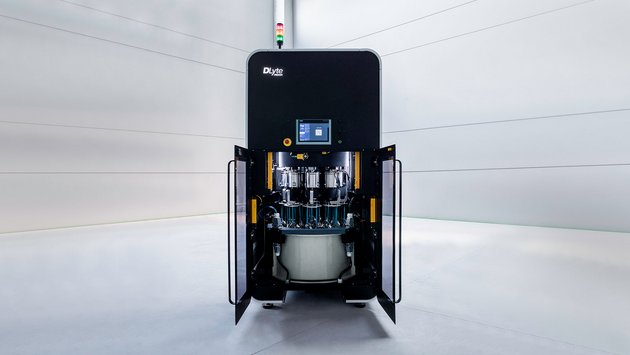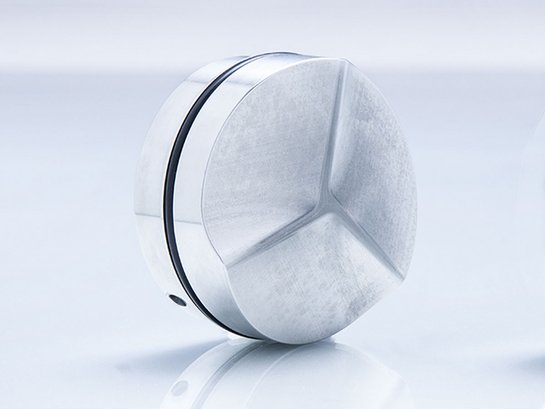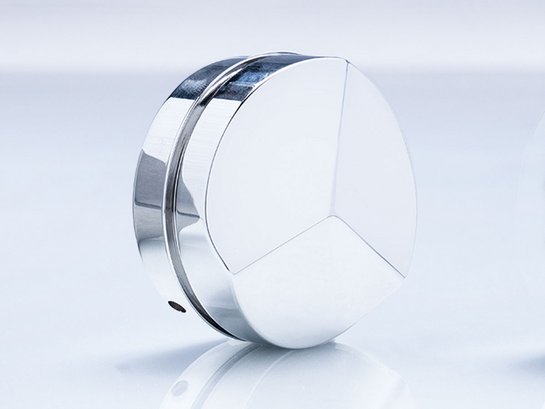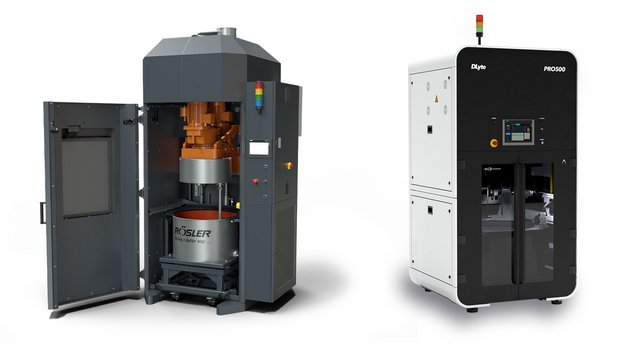
Surfaces with a high-gloss finish, as if polished by hand
With its patented DryLyte technology for dry electropolishing, the Spanish technology company GPAINNOVA has set new standards for the high-gloss polishing of metallic workpieces. Rösler is the exclusive German sales partner for GPAINNOVA's DLyte systems and an expert in the field of dry electropolishing. The most powerful model in the DLyte machine series for polishing metallic components is the DLyte PRO 500.
How it works
In dry electropolishing, the material is not removed from the metal workpiece to be processed mechanically, but by ion exchange. This takes place without the use of liquid and is therefore gentler in several respects than liquid electropolishing. Instead, polymer granulate enriched with electrolytes in the processing tank of the DLyte machine series serves as a carrier for the electrolyte absorbed by the workpiece. During the machining process, current flows from the container shell via the surfaces of the granulate particles to the workpiece. As a result, electrochemical reactions take place at the contact points between the workpiece and the granulate. The geometry and the dry properties of the granulate mean that only the roughness peaks of the surface structure of the workpiece are electrochemically influenced. Material is only removed at these contact points between the granulate and the component surface - in contrast to liquid electropolishing, where the workpiece is completely surrounded by the process fluid.
The more selective approach of the DryLyte process achieves a rapid increase in the contact area of the surface compared to conventional electropolishing. By only removing the roughness peaks, less material is removed overall.
Machine Specifications
The DLyte PRO500 series is tailored to the high requirements of the most technologically demanding industries, including the automotive, aerospace and medical technology sectors. The compact system delivers exceptional surface finishing results that can often only be achieved in a manual polishing process. In comparison, the DLyte PRO 500 works up to 10 times faster. In contrast to conventional polishing processes, the system is characterised by a uniform finish that leaves no micro-scratches on the surface and respects the tolerances of the workpiece.
The system is characterised by its compact technology and clear design: the workpiece holder consists of up to eight specially designed workpiece holders and enables the processing of individual parts as well as smaller batches. For the polishing process, the work station with the workpiece holder and the parts to be processed are immersed in the processing tank and moved through the electrolyte process medium with a combination of circulation, up and down and rotational movements.

The DLyte PRO500 is the largest model in the DryLyte machine series and is suitable for components with a maximum diameter of 700x250 mm. The machine can be seamlessly connected to the DLyte HUB and can therefore be fully digitised. In combination with the DLyte Automatet Cell solution, it can be easily automated and integrated into complex production lines.
The DLyte PRO500 is perfectly suited for the processing of:
- High-quality, sensitive workpieces that must not be damaged during machining.
- High-precision workpieces with very tight tolerances.
- Workpieces with very demanding surface finish requirements.
- Workpieces made of very tough and abrasion-resistant materials.
Extremely high-quality surface finish impresses


Hermann Kohnen Maschinenbau GmbH (HK-Maschinenbau) produces high-quality barista tools with technical perfection standards, the production of which, including complex mechanical finishing, used to be extremely time-consuming. The tamper, with which the coffee powder is pressed or tamped into the portafilter during espresso preparation, needs the perfect finish for aesthetic and practical reasons: its surface must meet the highest decorative requirements and at the same time offer as little surface area as possible for the coffee powder to adhere to. Both can only be achieved through extreme polishing, which was previously manual labour at HK Maschinenbau. A post on LinkedIn drew the attention of Managing Director Steffen Mallon to Rösler Oberflächentechnik GmbH, GPAINNOVA and the innovative dry electropolishing technology - and the opportunity to test these processes in the DLyte PRO500 at Rösler's commercial agency SGA. After the test processing at SGA, Steffen Mallon was enthusiastic: "We were particularly impressed by the fact that surfaces that would have been impossible to reach mechanically were also polished. The overall appearance of the parts is fantastic and has also impressed our customers!"
Process steps

The test processing of the tamper in SGA's CEC was carried out in two steps: Firstly, the parts were pre-treated in a Rösler drag finisher to quickly level out the roughness, then they were sent to the DLyte PRO500 for high-gloss polishing. Steffen Mallon was impressed by the results of this process, not only in terms of the surface quality achieved, but also because of the enormous time savings:
on average, it takes an employee around an hour to manually polish a barista tool set on the sanding block. In the Dlyte PRO500, eight parts can be processed in 45 minutes - after appropriate preparation in the drag finisher - and this with absolute reproducibility.